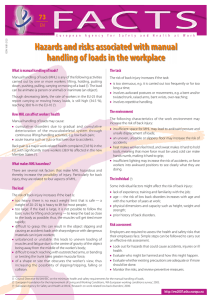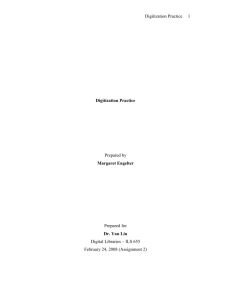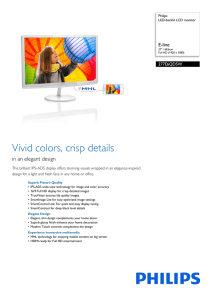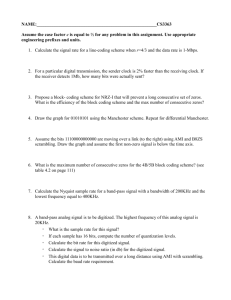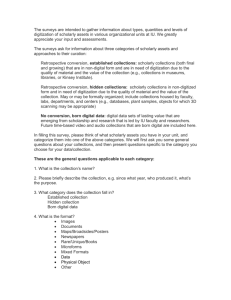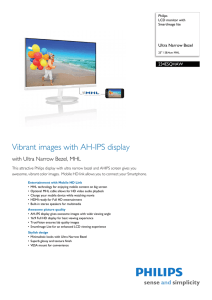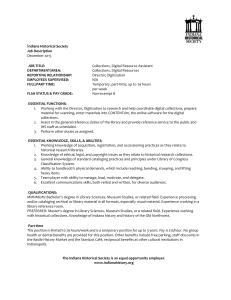MHL Institutional Digitization Survey
advertisement
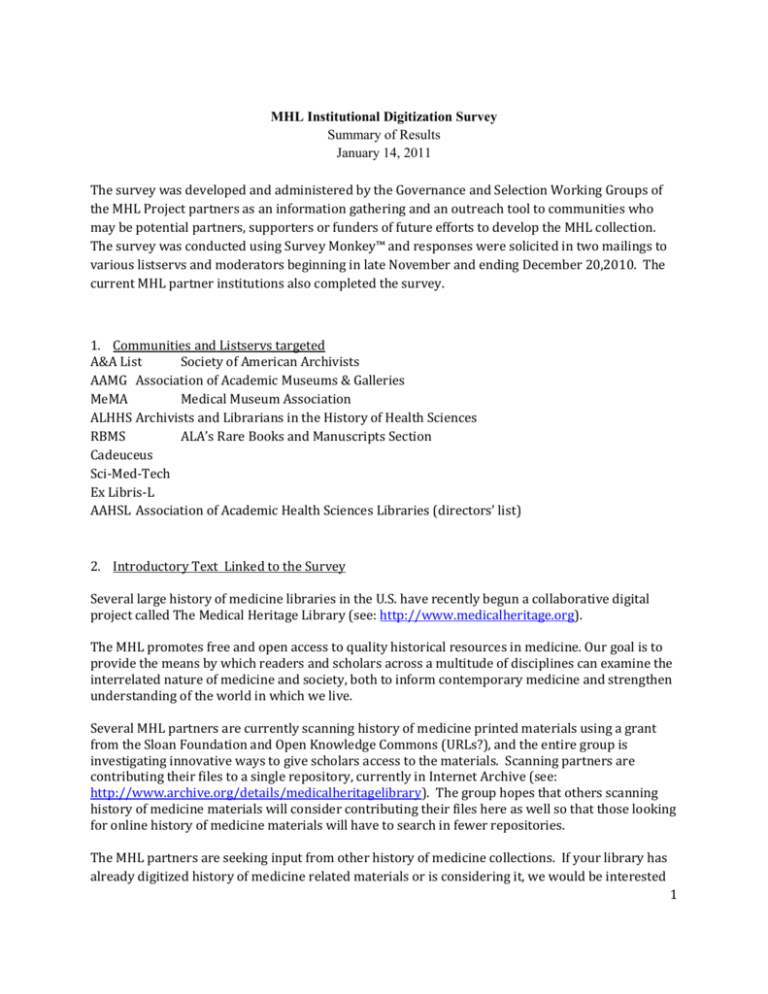
MHL Institutional Digitization Survey Summary of Results January 14, 2011 The survey was developed and administered by the Governance and Selection Working Groups of the MHL Project partners as an information gathering and an outreach tool to communities who may be potential partners, supporters or funders of future efforts to develop the MHL collection. The survey was conducted using Survey Monkey™ and responses were solicited in two mailings to various listservs and moderators beginning in late November and ending December 20,2010. The current MHL partner institutions also completed the survey. 1. Communities and Listservs targeted A&A List Society of American Archivists AAMG Association of Academic Museums & Galleries MeMA Medical Museum Association ALHHS Archivists and Librarians in the History of Health Sciences RBMS ALA’s Rare Books and Manuscripts Section Cadeuceus Sci-Med-Tech Ex Libris-L AAHSL Association of Academic Health Sciences Libraries (directors’ list) 2. Introductory Text Linked to the Survey Several large history of medicine libraries in the U.S. have recently begun a collaborative digital project called The Medical Heritage Library (see: http://www.medicalheritage.org). The MHL promotes free and open access to quality historical resources in medicine. Our goal is to provide the means by which readers and scholars across a multitude of disciplines can examine the interrelated nature of medicine and society, both to inform contemporary medicine and strengthen understanding of the world in which we live. Several MHL partners are currently scanning history of medicine printed materials using a grant from the Sloan Foundation and Open Knowledge Commons (URLs?), and the entire group is investigating innovative ways to give scholars access to the materials. Scanning partners are contributing their files to a single repository, currently in Internet Archive (see: http://www.archive.org/details/medicalheritagelibrary). The group hopes that others scanning history of medicine materials will consider contributing their files here as well so that those looking for online history of medicine materials will have to search in fewer repositories. The MHL partners are seeking input from other history of medicine collections. If your library has already digitized history of medicine related materials or is considering it, we would be interested 1 in hearing about your projects. We are also interested in the audiences you believe are using or would use such online resources. For this purpose, we have put together a survey for institutions interested in the digitization of history of medicine related materials. Please follow this link ... Please fill out the survey by November 30, 2010. 3. Responses: Number of unique (and complete) responses: 62 out of 64 Given the time of year and the method of distribution, this is probably an acceptable response rate. We had no good estimate of the numbers of institutions we were trying to reach. We have captured the name and contact information of the person completing the survey for future follow-up. 4.Types of organizations: Medical school library Other college/university library Hospital library Private medical society library Medical museum Other: % Types of organizations participating in the survey (n=62) 60 50 40 30 20 10 0 51.56 31.25 20.31 10.94 3.13 1.56 The largest response group included academic institutions and medical School libraries. Among the “others” were independent medical research libraries, a national library, biotechnology company, and a chiropractic college. 2 4. Which researchers tend to use your collections most? Please check all that apply. n Undergraduates Graduate students Physicians Medical historians Social/cultural historians Art historians Literature scholars Genealogists General public Image/film researchers Publishers Others Total & 17 35 31 39 20 10 8 18 14 15 9 11 227 9.34 19.23 17.03 21.43 10.99 5.49 4.40 9.89 7.69 8.24 4.95 6.04 124.73 Graduate students, physicians and medical historians are the largest groups of users which seems to reflect the types of organizations responding. Primary users of collections (n=182) 25 19.23 20 % 15 10 5 9.34 21.43 17.03 10.99 9.89 5.49 4.40 7.69 8.24 4.95 6.04 0 3 5. Have you digitized any history of medicine materials? Nearly 80% of respondents have digitized some historical materials. Yes: 50 No: 11 If so, what formats: n 21 14 14 29 37 2 12 8 10 147 Monographs Journals Bound manuscripts Archives Prints/photographs Microfilm/fiche Voice recordings Audiovisuals Other Total % 17.95 11.97 11.97 24.79 31.62 1.71 10.26 6.84 8.55 125.64 % Formats digitized (n=117) 35 30 25 20 15 10 5 0 31.62 24.79 17.95 11.97 11.97 10.26 6.84 8.55 1.71 Other-- specify, included materials that might have fit in other defined categories such as oral history transcripts, school yearbooks, course catalogs, clippings, minutes of county medical society meetings. The majority of these digitized resources reside in local and institutional repositories, followed closely by Internet Archives. 4 6. Where are your digitized files located? Please check all that apply: n % Local/institutional repository 43 76.79 Internet Archive 9 16.07 Hathi Trust 1 1.79 Google Books 4 7.14 Regional repository 6 10.71 Other 7 12.50 Total 70 125.00 % Locations of Digitized Files (n=56) 90 80 70 60 50 40 30 20 10 0 76.79 16.07 1.79 7.14 10.71 12.50 Other locations mentioned were Content dm, Flickr, and non-searchable computer storage devices. 5 Is your library interested in digitizing more of its history of medicine materials? n & Yes 51 110.87 No* 4 8.70 Total 55 119.57 All 4 cited not enough staff and insufficient funds as the reason. The responses confirm that lack of resources is the main barrier to further digitization efforts. A significant number of Institutions that are already digitizing and interested in digitizing more, cite user demand and acquired internal capacity as the reasons to digitize more. Reasons for digitizing (n=85) 35 30.59 28.24 30 % 25 22.35 20.00 20 15 11.76 10 5 0 User demand Now an Resources institutional now available priority Internal scanning operation Other Do you have regional or subject area collections in the history of medicine that you would like to digitize and share on the internet? n Yes No Total % 31 13 44 83.78 35.14 118.92 6 The “yes” responses should trigger follow-up to learn more about regional or subject collections that could strengthen the MHL collection. Responses are pretty evenly split between those who have received grant funding and those who have not with slight more reporting they have not. Have you received grant funding to digitize history of medicine materials? n Yes No Total % 22 28 50 52.38 66.67 119.05 % Sources of grant funding (n=28) 30 25 20 15 10 5 0 28.57 21.43 17.86 17.86 17.86 17.86 7
